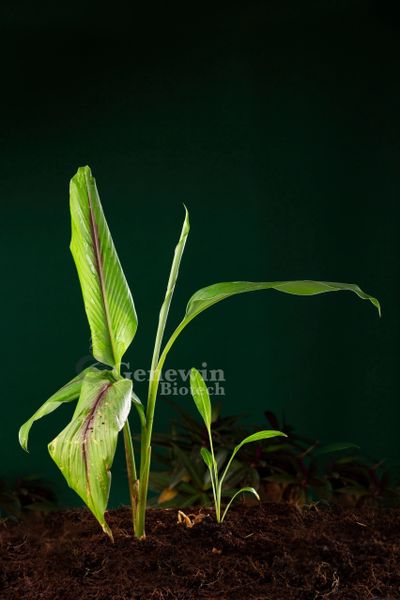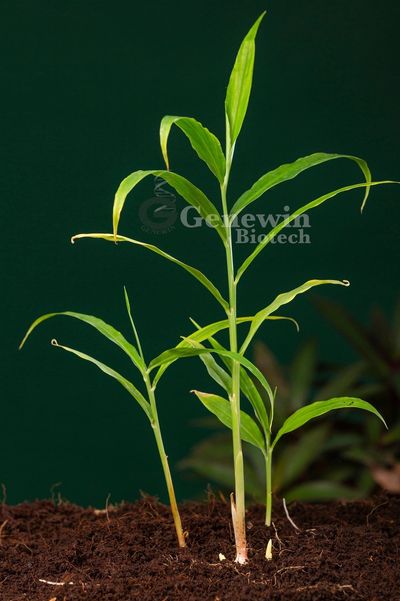- Krishnagiri, Tamil Nadu
- GST NO. : 33AAGFG9833P1ZT
- +91-8940444777, +91-9894393578
Medicinal Plants
Leading Manufacturers, Exporters and Wholesaler of Black Turmeric Tissue Culture Plant and Ginger Iisr Varada Tissue Culture Plant from Krishnagiri.
MOQ : 100 Piece
| Business Type | Manufacturer, Exporter, Supplier |
| Variety | Black Turmeric |
| Other Necessities | Well Watered |
| Suitable For | Farm |
| Soil Specific | Well Drained |
| Fertilizer | Organic Fertilizer |
Preferred Buyer From
| Location | Worldwide |
Turmeric Variety
Black Turmeric - Curcuma caesia
Local Names
- Kali Haldi (Hindi)
- Kari Manjal (Tamil)
Why Black Turmeric?
According to Indian Agricultural Dept., Black turmeric has been listed as an endangered species. Efforts are being made to protect and conserve Black turmeric. Genewin Biotech also plays major role in protecting Black Turmeric from extinct. Black turmeric is a rare herb. It is the underground portion of the stem, or rhizome, of the Curcuma caesia plant. The rhizome has been used for centuries for medicinal and religious purposes
Photo-Constituents
Dried rhizomes of Curcuma caesia are reported to contain
- 1.6% essential oil containing 76.6% d-camphor
- 8.2% camphene and bornylene
- 10.5% sesquiterpenes, curcumin, ionone, and turmerone
Medicinal Uses
Black turmeric contains the highest concentrations of curcumin of any plant species. It is a powerful antioxidant and anti-inflammatory. It has anti-bacterial and anti-fungal properties and is laxative. It is used as a tonic for the brain and the heart. The rhizome is traditionally used in the treatment of haemorrhoids, leprosy, asthma, cancer, fever, wounds, vomiting, menstrual disorder, anthelmintic, aphrodisiac, gonorrhoeal discharges leukoderma, piles, bronchitis, tumours, tuberculous glands of the neck, enlargement of the spleen, epileptic seizures, inflammations, and allergic eruptions. Furthermore, the smooth muscle relaxant, anti-tumour and antioxidant properties of Curcuma Caesia rhizome extract had been reported.
Plantation Guidelines
- Soil - light black, ashy loam, and red soils clay loam. However, it grows best in a well-drained sandy or clay loam. pH - 4 to 8.
- Temperature - 20 to 45 degree Celsius.
- Irrigation method - Sprinkler irrigation or Drip irrigation.
- Plant height when fully grown: 2– 3.5 feet.
- Plant spread: 5 – 14 inches.
- Flower colors: bluish white.
- Difficulty to grow: Easy to grow.
- Special features: Foliage & Rhizome.
- Suitable planting months - all round the year (Tissue Culture plants).
Planting Distance
1.5 feet x 1.5 feet
Plants Per Acre
15000 - 20000 plants per acre
Yield Period
7 - 9 months
Expected Yield
750 grams - 1200 grams per plant
Advantages of Tissue Culture Plants
- True to the type
- High market value
- High yield and quality
- Early Maturity
- Free from all diseases at the time of supply
- Throughout the year plantation possible
- Uniform growth
MOQ : 100 Piece
| Business Type | Manufacturer, Exporter, Supplier |
| Country of Origin | India |
| Variety | Ginger Iisr Varada |
| Other Necessities | Well Watered |
| Suitable For | Farm |
| Soil Specific | Well Drained |
| Fertilizer | Organic Fertilizer |
Preferred Buyer From
| Location | Worldwide |
Ginger Variety
IISR - Varada
Local Names
- Adi Adrack (Hindi)
- Adraka (Sanskrit)
- Inchi (Malayalam)
- Inchi (Tamil)
Special Characters
A good quality , high yielding variety with plumpy rhizomes having falttened finguers and medium sized reddish brown scales. Dry ginger less prone to storage insect damage. Farmers are of opinion that Varada is tolerant to diseases low fibre content.
Quality Attribute
- Essential oil - 1.75%
- Dry recovery - 20.7%
- Fibre content - 3.29-4.5%
Morphological Characters
- Colour of aerial shoot - Green
- Plant height (cm) - 72.32
- Leaf length/breadth (cm) - 28.3/2.5
- No. of tillers per clump - 9.4
- No. of leaves per tiller - 20
- Colour of rhizome core - blusish yellow
- Shape of rhizome - plumpy with flattened fingers.
- Colour of scale - Reddish brown
- Planting Distance
- 1.5 feet x 1.5 feet
Plants Per Acre
15000 - 20000 plants per acre
Yield Period
6 - 7 months
Expected Yield
750 grams - 3000 grams per plant
Advantages of Tissue Culture Plants
- True to the type
- High market value
- High yield and quality
- Early Maturity
- Free from all diseases at the time of supply
- Throughout the year plantation possible
- Uniform growth


